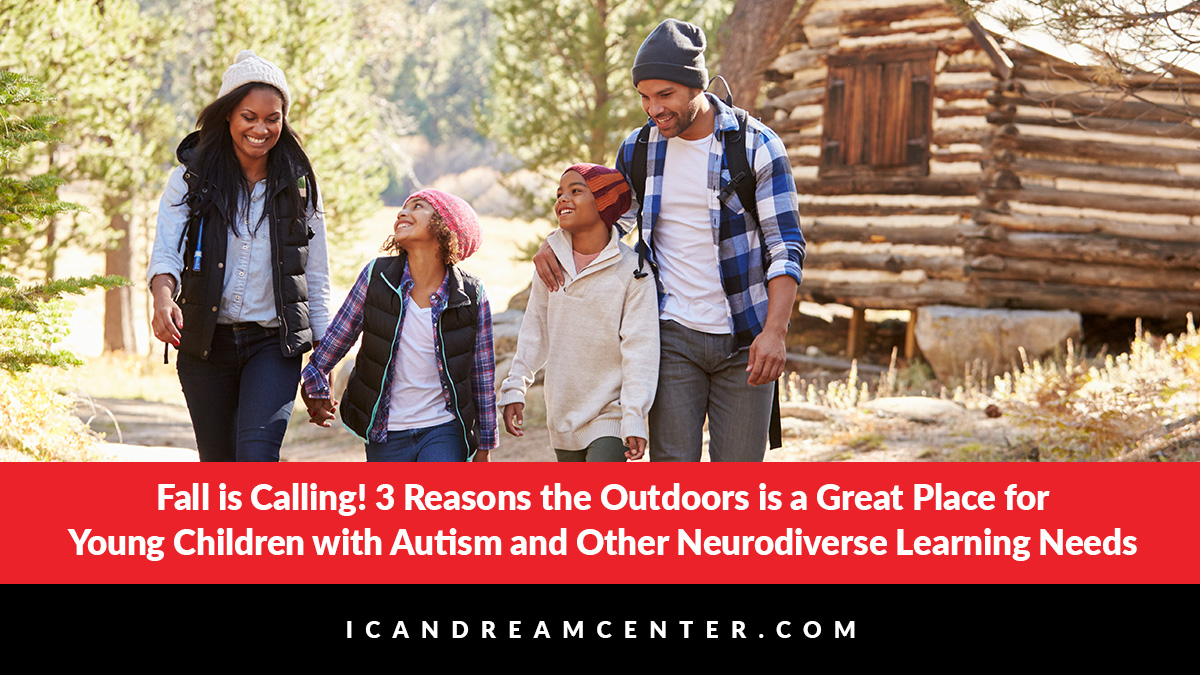
Fall is Calling! 3 Reasons the Outdoors is a Great Place for Young Children with Autism and Other Neurodiverse Learning Needs
For young children with autism and other neurodiverse learning needs, the great outdoors can be a sanctuary of growth and development. Nature offers a unique and enriching environment that can foster physical, emotional, and cognitive growth in these children. In this blog post, we will explore three compelling reasons why the outdoors is a fantastic place for young children with autism and neurodiverse learning needs.
- Sensory Enrichment
One of the most significant advantages of outdoor environments for children with autism and other neurodiverse conditions is the abundance of sensory stimuli. Nature provides a rich tapestry of sensory experiences that can help these children develop their sensory processing skills. Here’s how:
a. Calming and Grounding: Many children with autism experience sensory overload in bustling indoor spaces. The outdoors, with its open spaces, gentle breezes, and natural sounds, can have a calming and grounding effect. Nature’s repetitive patterns, such as waves lapping on the shore or leaves rustling in the wind, can provide a predictable and comforting sensory experience.
b. Sensory Exploration: The natural world offers an array of textures, colors, and smells to explore. Children can touch different types of leaves, feel the roughness of tree bark, or observe the vibrant hues of flowers. These tactile and visual experiences can promote sensory integration and help children develop a better understanding of their surroundings.
c. Auditory Sensitivity: For children with heightened auditory sensitivities, outdoor settings can be less overwhelming than indoor environments. The gentle sounds of birds chirping, water flowing, or insects buzzing can be therapeutic and provide opportunities for desensitization.
- Enhanced Social Skills
Outdoor activities often encourage social interaction and cooperative play, which can be particularly beneficial for children with autism and other neurodiverse learning needs who may struggle with social engagement. Here’s how the outdoors can foster social skills:
a. Shared Experiences: Outdoor play naturally promotes shared experiences, as children explore together, build forts, or engage in group activities like hiking or scavenger hunts. These shared experiences create opportunities for communication and cooperation.
b. Reduced Social Pressure: In the open space of nature, children may feel less pressure to conform to rigid social norms or expectations. This relaxed atmosphere can be conducive to developing more authentic social interactions.
c. Natural Communication: Outdoor environments often spark curiosity and wonder, leading to questions and discussions about the natural world. Children can engage in meaningful conversations about their observations, fostering language development and communication skills.
- Physical and Emotional Well-being
The outdoors offers numerous physical and emotional benefits for children with autism and neurodiverse learning needs:
a. Physical Activity: Outdoor spaces provide ample opportunities for physical activities such as running, climbing, and playing sports. Engaging in these activities helps improve gross motor skills, coordination, and muscle strength.
b. Stress Reduction: Nature has been proven to reduce stress and anxiety in individuals of all ages. For children with autism who may experience heightened levels of stress, spending time outdoors can be a natural remedy.
c. Emotional Regulation: The serene and tranquil atmosphere of nature can help children regulate their emotions. Natural settings can serve as a safe space for children to express themselves and learn emotional coping skills.
The great outdoors is a treasure trove of sensory enrichment, social opportunities, and physical and emotional well-being for young children with autism and other neurodiverse learning needs. By exposing these children to the wonders of nature, we can support their holistic development and help them thrive in a world that may sometimes seem overwhelming. So, let’s encourage outdoor adventures and embrace the healing power of the natural world for all children, regardless of their neurodiversity.
